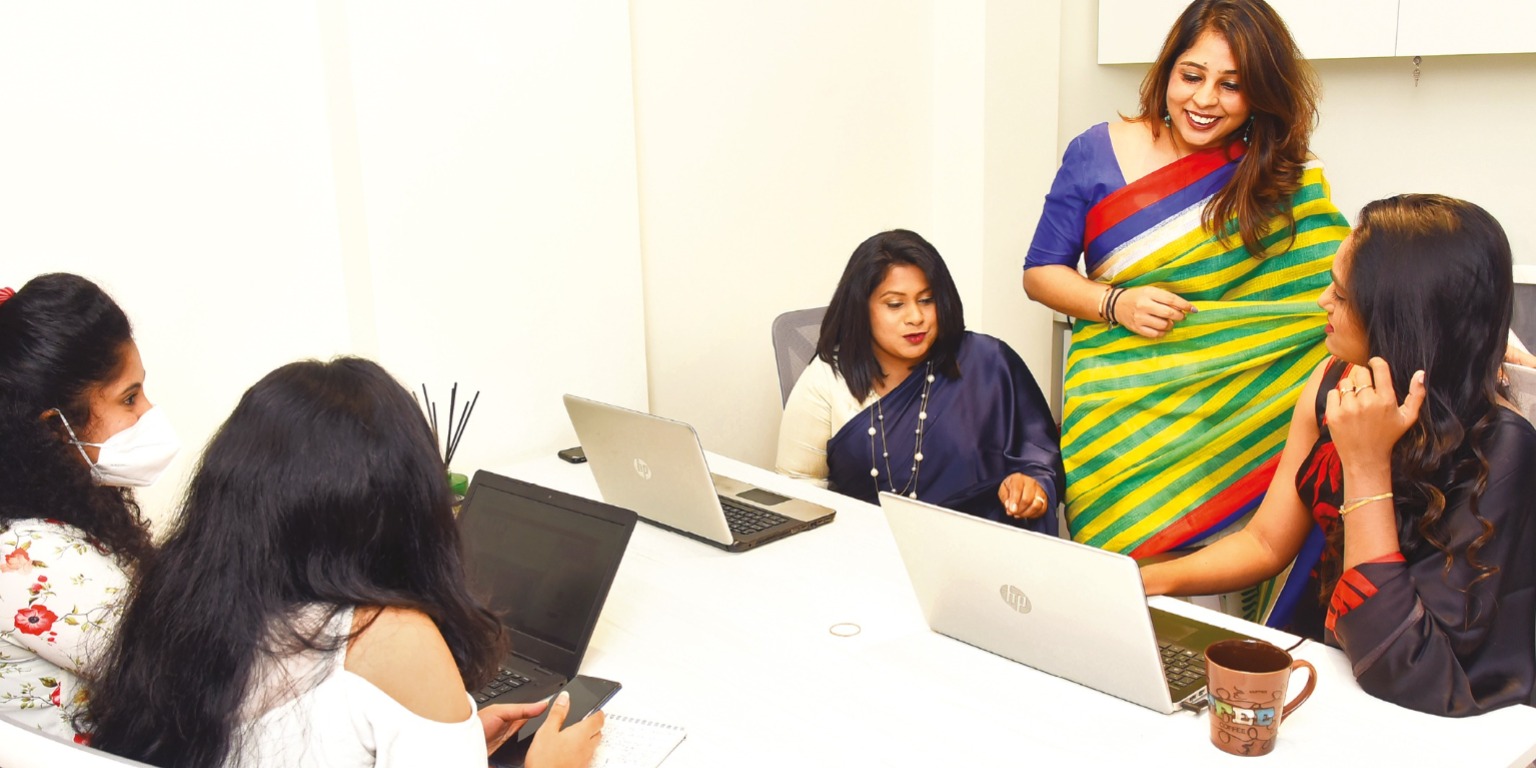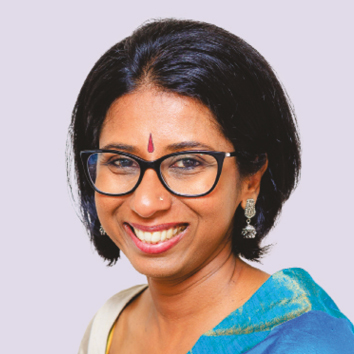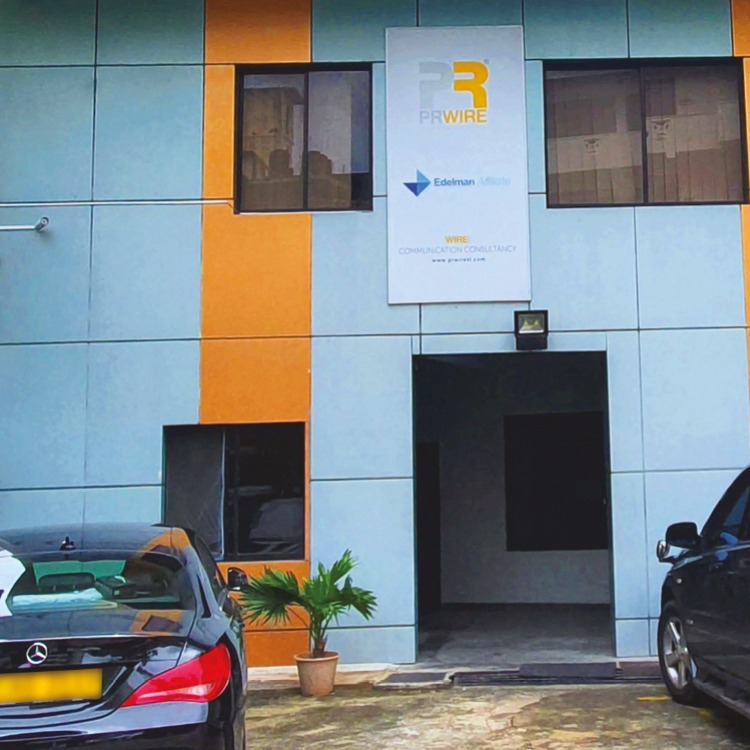PR WIRE GLOBAL
 Q: How can more women be encouraged to enter the tech arena?
Q: How can more women be encouraged to enter the tech arena?
Krishanthi Dhayalan (KD): The mind shifts among millennials have transformed thinking patterns about distinct fields. The current generations are exploring more non-conventional fields and these shifts have the capacity to open doors for more women to follow their professional dreams.
 In our culture, the participation of women and girls in such fields is restricted due to traditions and community pressures. There’s also a lack of representation and female role models to emulate in their desired fields.
In our culture, the participation of women and girls in such fields is restricted due to traditions and community pressures. There’s also a lack of representation and female role models to emulate in their desired fields.
Q: So how crucial is mentorship?
KD: I believe that a ‘woman-to-woman’ mentoring culture is as important as mandatory rituals such as compulsory military training after schooling in some countries or BCG inoculations we receive as kids!
Women entrepreneurs are fast-growing across the globe and in Sri Lanka, but many fail and step down along the way – due to personal and social boundaries, and the lack of encouraging mechanisms such as mentoring.
This would not only spur growth in the SME, micro, small and medium enterprise (MSME) and startup segments but also help create a sustainable impact on our country’s economy.
As a ‘mumpreneur,’ every step of my enterprise has been a steep learning curve. I’ve had to wear the hats of a strategist, a marketer, a finance adviser and much more. In such instances, a supportive and positive mentoring structure would not only help our mental wellbeing in business decisions, but could also be a major consolation to many women and girls experiencing the same thing.
 Q: To what extent are women represented in the public and private sectors?
Q: To what extent are women represented in the public and private sectors?
KD: In 2019, women held only 28 percent of managerial positions globally, based on the UN’s Sustainable Development Goal (SDG) 5.
SDG 5 – which aims to achieve gender equality, and empower all women and girls – began to have a greater impact in the private sector, forcing it to act promptly to showcase positive impacts leading to business growth. However, women’s representation in the public sector is disproportionately low in comparison.
With a paradigm shift towards gender equality and inclusiveness, if most private sector entities can embed inclusive representation in leadership ranks, it will help in implementing impactful business models.
Q: How can companies curtail the loss of women employees in mid-career?
 KD: PR Wire Group has created a flexible culture for our dynamic mothers, providing flexible hours to complete their daily schedules.
KD: PR Wire Group has created a flexible culture for our dynamic mothers, providing flexible hours to complete their daily schedules.
The group is also committed to best practices in female empowerment. This is evident in several of our digital and social media engagements where the ‘hero’ (project leader) is in fact a ‘heroine’ – a female team member. The global awards we have received for diversity are testimony to female empowerment in our workplace.
We also believe that it is important for corporates to prioritise team members’ wellbeing through a variety of related activities and promote open door discussions on mental health for all.
Q: Is the business climate conducive for women entrepreneurs?
Nipuni Madumali (NM): In Sri Lanka, we see many women initiating businesses at the grassroots level, founding micro and small businesses in their communities and homes.
In fact, the finance and banking sector has clearly identified this trend, and supports many females by empowering them through financial inclusion. Targeted lending and borrowing solutions have emerged due to the entrepreneurial spirit and grit displayed by these enterprising women.
Being in a strategic and business consultancy role through PR Wire Intel – PR Wire’s intelligence arm – we gathered many such insights and consumer behavioural attributes for clients. Our research indicates a shift in the startup ecosystem with growing female entrepreneurship in mid and larger companies as well.
Other than the entrepreneurial drive, businesses in particular can create and empower dynamic leaders, by identifying ‘intrapreneurship’ and passionate individuals with matching attitudes.
Q: Are women adequately represented in the country’s public and private sectors?
NM: Sri Lanka boasts having had the first female prime minister in the world, which was a major leap. Many women leaders had a great impact on our country but we lack the continuity of these roles or new leadership in what I call a ‘national service role.’
Shifting perceptions, opinions and equal opportunities are gradually growing. The responsibilities of serving the public as well as understanding one’s self-worth are needed for leadership and representation in roles for women.
Q: Can local businesswomen pursue global opportunities?
NM: Sri Lankan businesses have a blue ocean opportunity in the global marketplace. If female entrepreneurs apply themselves to identifying solutions to fill gaps, there are enough and more openings to thrive on a global scale.
Sri Lanka has produced many eminent businesswomen who are exceptional in their leadership, beliefs and values. Persistence, determination and confidence are a few traits of women that serve as strengths to achieve the unreachable.
As a local company, PR Wire truly believed in this and gave us the opportunity to not only think on a local scale but understand global behavioural patterns, thereby servicing an international clientele.
The organisation’s leadership team mostly comprises women. PR Wire is well on its way to establishing a regional office, providing greater potential for many aspiring female leaders to be a part of its journey.
Q: How crucial is it for women to assert themselves in the business world?
NM: The business world is vast and diverse, and will continue to evolve. Women led businesses will be created as a result of many females breaking barriers and realising their true potential. Companies will benefit by way of growth and efficiency due to more women in leadership roles.
Yet, numerous gender-based inequalities remain. We need to advocate the universal acceptance of gender equality through an inclusive and systematic approach.
 Q: How do you view the business climate from a female entrepreneur’s perspective?
Q: How do you view the business climate from a female entrepreneur’s perspective?
Shehara Alahakoon (SA): More women entrepreneurs in Sri Lanka have come to light during this pandemic. Most families that usually catered from large-scale restaurants and popular caterers turned into home cooks and bakers. Even seamstresses and other small-scale and home-based entrepreneurs have come forward to capture business opportunities.
Q: Do you believe that women are being supported to maximise their potential?
SA: To some extent, yes. Most parents are moving away from their belief that daughters need to ‘settle down’ after completing their studies; and most husbands are supportive of their wives continuing to work. Organisations too are considering women empowerment aspects.
Q: Is mentorship needed in this context?
SA: Proper mentoring is certainly important to achieve targets. For example, PR Wire’s culture has always been about nurturing, mentoring and empowering our female team members, to identify their potential and work towards achieving their targets while adding value to business processes.
Q: What is your take of female representation in the public and private sectors?
SA: Women’s representation has increased over the years and I believe that the 2030 Agenda for Sustainable Development emphasises the importance of gender equality, which is a major step towards increasing female representation in all sectors in Sri Lanka.
The organisational cultures in both public and private sectors should be spreading encouragement instead of demotivation, which would directly impact female representation.
Q: Do Sri Lankan businesswomen have the potential to go global?
SA: Of course – and there are some great examples too such as Sri Lankan women in foreign parliaments and many other business ventures. Initiatives such as the Sri Lankan Women Trading Globally Programme help local women achieve their aspirations on a global platform.
Q: What can organisations do to address the loss of women employees in mid-career?
SA: I believe that many women quit working once they are married and especially after giving birth.
Moreover, I’ve observed a global shift towards policies and guides to prepare team members to offer flexibility and support – both physically and mentally – once women return to work after childbirth.
The support from the leadership, and ensuring that they can be authentic and walk into work as their true selves, is important to avoid losing female team members in mid-career.
I’m proud to say that at PR Wire, we are offered optimum flexibility such as working from home (WFH) options, flexible hours and above all, significant mental support to balance both work and personal lives.
I am honoured to be a part of the diversity and inclusion team where, together with the leadership team, we constantly evaluate the changing requirements of team members and offer flexible options.
 Q: How do you view the prevailing landscape for female entrepreneurs?
Q: How do you view the prevailing landscape for female entrepreneurs?
Anjuu Bakshani (AB): The business climate has changed over the last few years with more women entrepreneurs breaking barriers and taking the opportunity to enter areas previously dominated by men.
It’s certainly a positive change and growing because when more women are given the opportunity, more employment is generated, leading to better economies of scale. The ability to understand societal needs and act on these issues is an area we should focus on, and I believe women can achieve greater success identifying these needs and wants.
At PR Wire Group, we’re encouraged to work as entrepreneurs. Our Founder and Chairman Ashan Kumar, and Director of Business, Strategy and Impact Relations Krishanthi Dhayalan, instilled this culture in all of us and support us completely.
Q: Are women adequately supported in achieving their potential?
AB: There is growing interest in this topic. In certain businesses, men and women are given equal opportunities but the same cannot be said for all. Some are still male dominated, and don’t believe that women can juggle personal and professional lives.
With WFH becoming the new norm, the dynamics of everything has changed. Companies have finally realised that this not only benefits women but men as well.
We need to begin adapting to the changing times with daycare facilities for new mothers. With WFH becoming part of our ‘new normal,’ instituting these practices will give mothers a good work-life balance.
Q: How important is mentorship in this context?
AB: Mentorship is always vital in any context. It is essential to have people who can guide and advise us in different aspects of our lives.
It’s critical especially for women because employment is always a new challenge and journey for us. I believe that knowledge is power whether it’s book-based or gained from experience. A mentor who has successfully overcome obstacles can offer valuable insights to aspiring entrepreneurs.
Mentors who realise the importance of a balanced approach, and the true meaning of inclusivity and empowerment, are essential in all companies. They should present their thoughts to the leadership and implement them to help others realise their true potential.
Q: Are Sri Lankan businesswomen capable of operating on a global scale?
AB: Sri Lankan businesswomen are already going global – many are working in Fortune 500 companies. Brands such as Selyn and House of Lonali are run by women who have made waves globally.
So it’s not a case of whether we have the potential; we’re already doing it. The question is whether we have the necessary support to go global.
It is important to groom and support future women entrepreneurs. I believe that this is a vital area for any nation to be self-sufficient and innovative, and build stronger economies.



